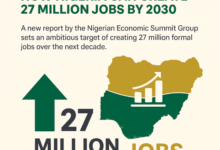At 59, Nigeria Needs New National Business Model To Progress—Soludo
 As Nigeria celebrated its 59th independence yesterday, a former Governor of the Central Bank of Nigeria (CBN), Prof. Charles Soludo has urged the Buhari-led Federal Government to employ new national business models in a bid to get the country to its desired progressive destination.
As Nigeria celebrated its 59th independence yesterday, a former Governor of the Central Bank of Nigeria (CBN), Prof. Charles Soludo has urged the Buhari-led Federal Government to employ new national business models in a bid to get the country to its desired progressive destination.
Prof. Soludo made the call while delivering his keynote speech at the Platform Conference organised by the Covenant Christian Centre to commemorate Nigeria’s 59th independence yesterday at the Covenant Place, Iganmu, Lagos.
Speaking on the theme entitled ‘the economic restructuring of Nigeria’, Soludo said: ‘‘if our focus is wealth creation for the future instead of sharing and consumption of oil rents, then we need a new national business model. We are designing good ideas and plans but without the right underlying infrastructure to guide the plans, we won’t move forward’, he added.
He noted that since in twenty years time, crude oil which is at present Nigeria’s major income source will be history, the Federal Government should strategise for the post oil economy.
Dwelling on a roadmap of institutional arrangement that will help to sustain the future of Nigerian economy, the former CBN governor said it is regrettable that since 1962, the Nigerian government has implemented four development plans all designed to diversify and restructure the economy away from dependence on oil, but nothing remarkable has changed.
He said every government in Nigeria over the last two decades has implemented his own version of restructuring and diversification but none has been able to achieve the desired results because they have been changing only the economic structure but not the underlying institutions.
READ ALSO: ‘CBN Will Cut Monetary Policy Rate, If…’– Emefiele
‘If you want to change a persistent economic structure, you have to change the underlying institution. Our experience with the NEEDs proved this. While we were drafting the NEEDs agenda, we realised that we have been piloting private sector-led economy in Nigeria without having the requisite financial institution which didn’t work out because it is not possible to have a private sector-led economy without an underlying financial institution’, he said.
To drive home his point, Soludo recalled one of his key achievements while at the saddle of CBN. He said when he assumed office as the apex bank governor; there were only ’89 rickety banks’ in the country. ‘All these banks put together were less than the No. 4 bank in South Africa. So they couldn’t assist investors with loans that will bring quality investment into the country. Therefore, we came up with a new institution which was a consolidation of the banking sector’, he added.
‘After implementing this move, we had a capital raise of $200 million and reached a top level. This led to the emergence of bigger and better banks in the country. Afterwards, our banks became the new multinationals all over the world. Today, our banks can now syndicate billions of dollars for investors to be able to invest. That is how the private sector economy can begin.’
For the national economy, the ex-CBN governor noted that since one can’t build a 100-storey building upon the foundation of a bungalow, ‘it will be difficult to have a competitive and prosperous post oil economy for the future while millions of Nigerian citizens live on dwindling land space with the same legal institutional foundation designed for the consumption of the oil rents.
He said ‘the post oil economy requires that agency maximize their fullest potentials with a national rather than a federal response as one can’t clap with one hand.
He wondered why the link between law, constitution, institutions, the judiciary and the economic transformation of the Federal Government seems to be the weakest in the government’s design for national agenda, urging the national assembly, the minister of justice, the state and other stakeholders in the country to get on seriously with the national assignment.
Samson Oyedeyi











